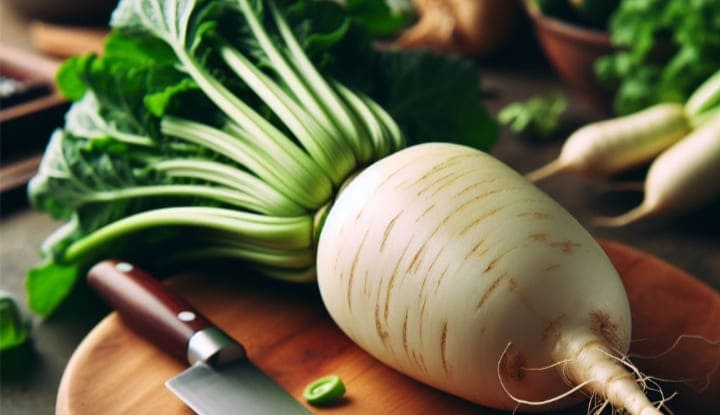
This article explores the five significant benefits of radish for liver, according to scientific evidence and providing practical tips to optimize each of the benefits.
Radishes, a member of the cruciferous vegetable family, are often overlooked for their more popular counterparts like broccoli and cauliflower.
Radishes offer a unique set of benefits for liver health, thanks to their rich nutrient profile and bioactive compounds. Here are The 5 Significant Benefits of radishes for liver:
1. Supports Liver Detoxification
Radishes contain compounds that support liver detoxification. The liver is responsible for filtering toxins from the body, and consuming radishes can help enhance its detoxification processes.
Radishes stimulate the production of bile, which helps remove toxins from the liver and improve its overall function.
Radishes contain a compound called RsPHGPx, which acts as an antioxidant in the phase 2 liver detoxification pathways. This detox pathway helps disarm harmful chemicals, such as pain relievers, nicotine, insecticides, and other cancer-causing molecules, promoting liver health. Consuming radishes regularly can help reduce the risk of liver disease and improve liver health.
Key Nutrients:
- Sulforaphane: A compound that has been shown to induce the production of detoxification enzymes in the liver.
- Glutathione: An antioxidant that helps neutralize toxins and protect liver cells from damage.
Tip: To optimize the liver-detoxifying benefits of radishes, consume them in conjunction with other liver-supporting foods, such as leafy green vegetables, citrus fruits, and turmeric.
Also Checkout:
- Benefits Of White Radish Leaves
- Benefits of Radishes During Pregnancy
- Benefits of Radish Salad and Recipes
- Skin Benefits of Black Radish
- Benefits Of Black Radish
- Benefits and Uses of Radish Water
- White Radish Soup: Health Benefits and Recipes
- Benefits of Korean Pickled
2. Reduces Liver Inflammation
Radishes have anti-inflammatory properties that can help reduce liver inflammation. Liver inflammation is a common problem that can lead to liver damage and disease.
Radishes contain compounds that have been shown to inhibit the production of inflammatory cytokines, which are signaling molecules that promote inflammation.
Consuming radishes regularly can help reduce liver inflammation by:
- Inhibiting the production of inflammatory cytokines.
- Protecting liver cells from damage caused by free radicals.
- Improving blood flow to the liver.
Key Nutrients:
- Anthocyanins: Pigments that have been shown to have anti-inflammatory effects.
- Isothiocyanates: Compounds that have been shown to inhibit the production of inflammatory cytokines.
Tip: To optimize the liver-inflammation-reducing benefits of radishes, consume them regularly as part of a balanced diet. You can also apply radish juice topically to the liver area as a natural anti-inflammatory treatment.
3. Protects Against Liver Damage
Radishes contain antioxidants that protect liver cells from damage caused by free radicals. Free radicals are unstable molecules that can damage cells and contribute to the development of chronic diseases, including liver disease.
Radishes contain compounds that have been shown to neutralize free radicals and protect liver cells from damage.
Consuming radishes regularly can help protect against liver damage by:
- Neutralizing free radicals and protecting liver cells from damage.
- Reducing oxidative stress, which can contribute to liver damage.
- Improving liver function and overall health.
Key Nutrients:
- Vitamin C: A powerful antioxidant that helps protect liver cells from damage.
- Vitamin E: Another antioxidant that helps protect liver cells from damage caused by free radicals.
Tip: To optimize the liver-protective benefits of radishes, consume them regularly as part of a balanced diet. You can also drink radish juice or take radish supplements to increase your intake of liver-protective compounds.
4. Improves Liver Function
Radishes contain nutrients that are essential for liver function. These nutrients include vitamin C, vitamin K, and folate. Vitamin C is involved in the production of bile, which helps remove toxins from the liver.
Vitamin K is involved in blood clotting and helps prevent excessive bleeding. Folate is involved in DNA synthesis and repair, which is essential for healthy liver function.
Consuming radishes regularly can help improve liver function by:
- Providing essential nutrients for liver function, such as vitamin C, vitamin K, and folate.
- Stimulating the production of bile, which helps remove toxins from the liver.
- Improving blood flow to the liver.
Tip: To optimize the liver-function-improving benefits of radishes, consume them regularly as part of a balanced diet. You can also drink radish juice or take radish supplements to increase your intake of liver-supporting nutrients.
5. May Help Prevent Liver Disease
Radishes contain compounds that have been shown to have anti-cancer properties. These compounds may help prevent the development of liver cancer and other types of liver disease.
Radishes contain sulforaphane, a compound that has been shown to inhibit the growth of cancer cells. Additionally, radishes contain antioxidants that protect liver cells from damage caused by free radicals.
Consuming radishes regularly may help prevent liver disease by:
- Inhibiting the growth of cancer cells.
- Protecting liver cells from damage caused by free radicals.
- Improving liver function and overall health.
Key Nutrients:
- Sulforaphane
- Antioxidants
Tip: To optimize the liver-disease-prevention benefits of radishes, consume them regularly as part of a balanced diet. You can also drink radish juice or take radish supplements to increase your intake of anti-cancer and liver-protective compounds.

Precautions for Individuals With Pre-existing Liver Conditions When Consuming Radishes
While radishes offer many benefits for liver health, individuals with pre-existing liver conditions should exercise caution and consult with a healthcare professional or registered dietitian before making significant dietary changes. Here are some considerations and precautions for individuals with liver conditions when consuming radishes:
- Moderation: It is important to consume radishes in moderation, especially if you have a liver condition. While radishes can be beneficial, excessive consumption may not be suitable for everyone. Your healthcare professional can guide you on the appropriate portion sizes based on your specific condition.
- Allergies or Sensitivities: Some individuals may be allergic or sensitive to radishes. If you have a known allergy or sensitivity to radishes or other cruciferous vegetables, it is best to avoid or limit your intake to prevent any adverse reactions.
- Medication Interactions: If you are taking any medications for your liver condition, certain compounds in radishes may interact with these medications. It is crucial to discuss your medication regimen with your healthcare professional to ensure there are no potential interactions.
- Digestive Issues: Radishes are known for their strong flavor and can sometimes cause digestive discomfort, such as bloating or gas, in some individuals. If you experience any digestive issues after consuming radishes, it is advisable to reduce your intake or try different cooking methods to make them more easily digestible.
- Individualized Advice: Each liver condition is unique, and individuals may have different dietary needs and restrictions. Your healthcare professional or registered dietitian can provide personalized advice and guidance based on your specific liver condition, overall health, and medical history.
Additional Tips:
- Choose organic radishes whenever possible to minimize exposure to pesticides and other chemicals.
- Wash radishes thoroughly before consuming them to remove any dirt or bacteria.
- Store radishes properly in the refrigerator to maintain their freshness and nutrient content.
Remember, it is always best to consult with a healthcare professional or registered dietitian before making any significant dietary changes, especially if you have pre-existing liver conditions or medical concerns. They can provide you with the most appropriate recommendations tailored to your specific needs and help ensure your safety and well-being.
More Like This:
- Sweet Potato Chips: Benefits, Side Effects, & Recipes
- Health Benefits of Zucchini
- Benefits of Boiled Mango Leaves
- Chewing Mango Leaves: Benefits, Risks, and More
- 10 Health Benefits Of Mango and Guava Leaves
- Mango Leaves Water: Nutrition, Benefits, Side Effects
- Benefits of Mango Leaves for Face, Skin, and Hair
Conclusion on Benefits of Radish for Liver
Radishes offer a range of significant benefits for liver health, including supporting liver detoxification, reducing liver inflammation, protecting against liver damage, improving liver function, and potentially preventing liver disease.
By incorporating radishes into your diet, you can harness these benefits and improve your overall liver health.
Disclaimer: The information provided in this article is for informational purposes only and does not constitute medical advice. It is important to consult with a qualified healthcare professional before making any changes to your diet or lifestyle.
Learn more:






